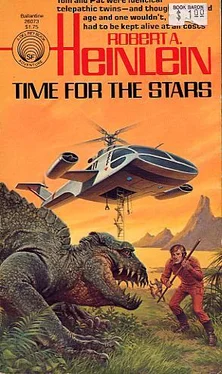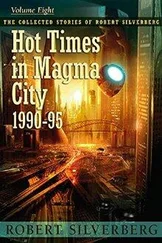Robert Heinlein - Time For The Stars
Здесь есть возможность читать онлайн «Robert Heinlein - Time For The Stars» весь текст электронной книги совершенно бесплатно (целиком полную версию без сокращений). В некоторых случаях можно слушать аудио, скачать через торрент в формате fb2 и присутствует краткое содержание. Жанр: Фантастика и фэнтези, на английском языке. Описание произведения, (предисловие) а так же отзывы посетителей доступны на портале библиотеки ЛибКат.
- Название:Time For The Stars
- Автор:
- Жанр:
- Год:неизвестен
- ISBN:нет данных
- Рейтинг книги:3 / 5. Голосов: 1
-
Избранное:Добавить в избранное
- Отзывы:
-
Ваша оценка:
- 60
- 1
- 2
- 3
- 4
- 5
Time For The Stars: краткое содержание, описание и аннотация
Предлагаем к чтению аннотацию, описание, краткое содержание или предисловие (зависит от того, что написал сам автор книги «Time For The Stars»). Если вы не нашли необходимую информацию о книге — напишите в комментариях, мы постараемся отыскать её.
Time For The Stars — читать онлайн бесплатно полную книгу (весь текст) целиком
Ниже представлен текст книги, разбитый по страницам. Система сохранения места последней прочитанной страницы, позволяет с удобством читать онлайн бесплатно книгу «Time For The Stars», без необходимости каждый раз заново искать на чём Вы остановились. Поставьте закладку, и сможете в любой момент перейти на страницу, на которой закончили чтение.
Интервал:
Закладка:
Robert Heinlein
Time For The Stars
I THE LONG RANGE FOUNDATION
According to their biographies, Destiny's favored children usually had their lives planned out from scratch. Napoleon was figuring on how to rule France when he was a barefoot boy in Corsica, Alexander the Great much the same, and Einstein was muttering equations in his cradle.
Maybe so. Me, I just muddled along.
In an old book that belonged to my great grandfather Lucas I once saw a cartoon of a man in evening clothes, going over a ski jump. With an expression of shocked unbelief he is saying: "How did I get up here?"
I know how he felt. How did I get way up here?
I was not even planned on. The untaxed quota for our family was three children, then my brother Pat and I came along in one giant economy package. We were a surprise to everyone, especially to my parents, my three sisters, and the tax adjusters. I don't recall being surprised myself but my earliest recollection is a vague feeling of not being quite welcome, even though Dad and Mum, and Faith, Hope, and Charity treated us okay.
Maybe Dad did not handle the emergency right. Many families get an extra child quota on an exchange basis with another family, or something, especially when the tax-free limit has already been filled with all boys or all girls. But Dad was stubborn, maintaining that the law was unconstitutional, unjust, discriminatory, against public morals, and contrary to the will of God. He could reel off a list of important people who were youngest children of large families, from Benjamin Franklin to the first governor Of Pluto, then he would demand to know where the human race would have been without them?—after which Mother would speak soothingly.
Dad was probably accurate as he was a student of almost everything, even his trade, which was micromechanics—but especially of history. He wanted to name us for his two heroes in American history, whereas Mother wanted to name us for her favorite artists: This is how I ended up as Thomas Paine Leonardo da Vinci Bartlett and my twin became Patrick Henry Michelangelo Bartlett. Dad called us Tom and Pat and Mother called us Leo and Michel and our sisters called us Useless and Double-Useless. Dad won by being stubborn.
Dad was stubborn. He could have paid the annual head tax on us supernumeraries, applied for a seven-person flat, and relaxed to the inevitable. Then he could have asked for reclassification. Instead be claimed exemption for us twins each year, always ended by paying our head tax with his check stamped "Paid under Protest!" and we seven lived ina five-person flat. When Pat and I were little we slept in homemade cribs in the bathroom which could not have been convenient for anybody, then when we were bigger we slept on the living-room couch, which was inconvenient for everybody, especially our sisters, who found it cramping to their social life.
Dad could have solved all this by putting in for family emigration to Mars or Venus, or the Jovian moons, and he used to bring up the subject. But this was the one thing that would make Mum more stubborn than he was. I don't know which part of making the High Jump scared her, because she would just settle her mouth and not answer. Dad would point out that big families got preferred treatment for emigration and that the head tax was earmarked to subsidize colonies off Earth and why shouldn't we benefit by the money we were being robbed of? To say nothing of letting our children grow up with freedom and elbow room, out where there wasn't a bureaucrat standing behind every productive worker dreaming up more rules and restrictions? Answer me that?
Mother never answered and we never emigrated,
We were always short of money. Two extra mouths, extra taxes, and no family assistance for the two extras make the stabilized family income law as poor a fit as the clothes Mum cut down for us from Dad's old ones. It was darn' seldom that we could afford to dial for dinner like other people and Dad even used to bring home any of his lunch that he didn't eat. Mum went back to work as soon as we twins were in kindergarten, but the only household robot we had was an obsolete model "Morris Garage" Mother's Helper which was always burning out valves and took al most as long to program as the job would have taken. Pat and I got acquainted with dish water and detergents—at least I did; Pat usually insisted on doing the sterilizing or had a sore thumb or something.
Dad used to talk about the intangible benefits of being poor—learning to stand on your own feet, building character, and all that. By the time I was old enough to understand I was old enough to wish they weren't so intangible, but, thinking back, maybe he had a point. We did have fun. Pat and I raised hamsters in the service unit and Mum never objected. When we turned the bath into a chem lab the girls did make unfriendly comments but when Dad put his foot down, they sweet-talked him into picking it up again and after that they hung their laundry somewhere else, and later Mum stood between us and the house manager when we poured acid down the drain and did the plumbing no good.
The only time I can remember when Mum put her foot down was when her brother, Uncle Steve, came back from Mars and gave us some canal worms which we planned to raise and sell at a profit. But when Dad stepped on one in the shower (we had not discussed our plans with him) she made us give them to the zoo, except the one Dad had stepped on, which was useless. Shortly after that we ran away from home to join the High Marines—Uncle Steve was a ballistics sergeant—and when lying about our age did not work and they fetched us back, Mum not only did not scold us but had fed our snakes and our silkworms while we were gone.
Oh, I guess we were happy. It is hard to tell at the time. Pat and I were very close and did everything together but I want to get one thing straight: being a twin is not the Damon-and-Pythias dream that throb writers would have you think. It makes you close to another person to be born with him, share a room with him, eat with him, play with him, work with him, and hardly ever do anything without him as far back as you can remember, and farther according to witnesses. It makes you close; it makes you almost indispensable to each other-but it does not necessarily make you love him.
I want to get this straight because there has been a lot of nonsense talked about it since twins got to be suddenly important. I'm me; I'm not my brother Pat. I could always tell us apart, even if other people couldn't. He is the right-handed one; I'm the left-handed one. And from my point of view I'm the one who almost always got the small piece of cake.
I can remember times when he got both pieces through a fast shuffle. I'm not speaking in general; I'm thinking of a certain white cake with chocolate icing and how he confused things so that he got my piece, too, Mum and Dad thinking he was both of us, despite my protests. Dessert can be the high point of the day when you are eight, which was what we were then.
I am not complaining about these things... even though I feel a dull lump of anger even now, after all the years and miles, at the recollection of being punished because Dad and Mum thought I was the one who was trying to wangle two desserts. But I'm just trying to tell the truth. Doctor Devereaux said to write it all down and where I have to start is how it feels to be a twin. You aren't a twin, are you? Maybe you are but the chances are forty-four to one that you aren't—not even a fraternal, whereas Pat and I are identicals which is four times as unlikely.
They say that one twin is always retarded—I don't think so. Pat and I were always as near alike as two shoes of a pair. The few times we showed any difference I was a quarter inch taller or a pound heavier, then we would even out. We got equally good marks in school; we cut our teeth together. What he did have was more grab than I had, something the psychologists call "pecking order." But it was so subtle you could not .define it and other people could not see it. So far as I know, it started from nothing and grew into .a pattern that neither of us could break even if we wanted to.
Читать дальшеИнтервал:
Закладка:
Похожие книги на «Time For The Stars»
Представляем Вашему вниманию похожие книги на «Time For The Stars» списком для выбора. Мы отобрали схожую по названию и смыслу литературу в надежде предоставить читателям больше вариантов отыскать новые, интересные, ещё непрочитанные произведения.
Обсуждение, отзывы о книге «Time For The Stars» и просто собственные мнения читателей. Оставьте ваши комментарии, напишите, что Вы думаете о произведении, его смысле или главных героях. Укажите что конкретно понравилось, а что нет, и почему Вы так считаете.












